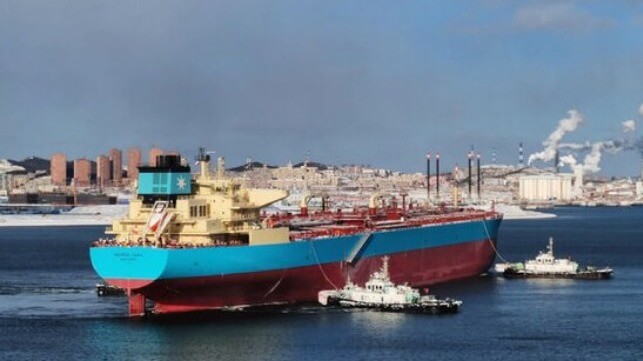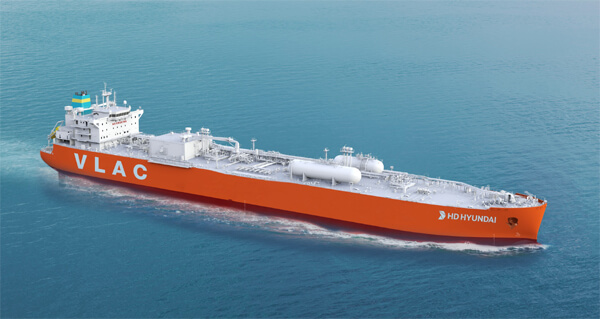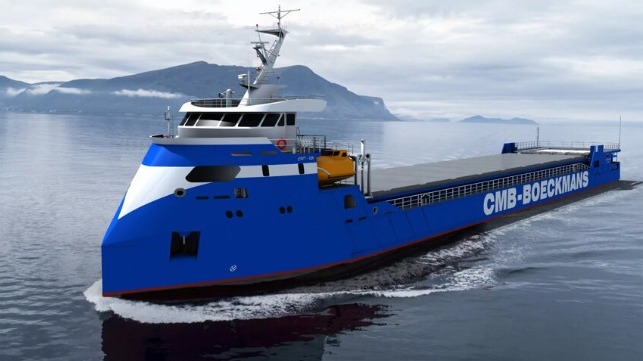Maersk Tankers Looks to Lead Industry with Order for Large Ammonia Tankers

After having left ship ownership to become a manager and pool operator, Maersk Tankers along with investment partner Mitsui & Co. looks to lead the tanker sector into ammonia transportation. The company, which is owned by A.P. Moller Holding and has Mitsui as an investor in Maersk Product Tankers, placed the largest tanker order to date in the ammonia sector.
Maersk Tankers reported that it has placed an order with Hyundai Samho Heavy Industries in South Korea for large ammonia carriers. It includes a firm order for four tankers as well as options for up to six additional vessels. Maersk Tankers will operate the vessels and expects them to enter the charter pool by 2027 with Mitsui as a co-investor in the first four vessels. HD Korea Shipbuilding & Marine Engineering, the holding company for the shipyard, reported the value of the four-vessel order at $432.4 million.
Maersk highlights that many of today’s clean ammonia projects under development will require seaborne transportation. Ammonia is poised to become a fuel source as well as a carrier for hydrogen which can be released through a cracking process. Maersk Tankers looks to become a first mover in the sector responding to the market which is looking for solutions to transport larger volumes of ammonia.
“Concrete actions are needed for the tanker industry to progress the energy transition, and in Maersk Tankers, we want to play our part in making transportation of clean energy a reality,” said Tina Revsbech, CEO of Maersk Tankers.
The newbuilds will have a capacity of 93,000 cbm, which will be among the largest ammonia carriers in operation, capable of carrying a full cargo of ammonia. The first four VLACs are due to be delivered between late 2026 and the second half of 2027.
Maersk Tankers reports it is working with MAN Energy Solutions and Hyundai Heavy Industries’ Engine Machine Division (EMD) to make the vessels capable of running on ammonia. However, a decision to install ammonia-capable engines requires both regulatory and customer support.

Hyundai's rendering of large ammonia gas carriers
Both companies look to leverage their experience in gas tankers to develop this new segment of the market. Maersk Tankers highlights it was an early entrant into LPG and ammonia shipping starting in 1972 and continuing till it sold its gas tanker business in 2013. This year, the company again began managing gas tankers and reports it has nearly 30 very large gas carriers VLGCs now under management. Maersk Tankers manages a fleet of 150 vessels with 40 pool partners.
HD Korea Shipbuilding has been working on the development of designs for large ammonia gas carriers, having previously received design approvals from leading classification societies. Hyundai is building the segment reporting in September an order for four 88,000 cbm ammonia tankers with two to be delivered to EPS while the other two are being built for Greece’s Capital Management and will be operated by EPS. The deliveries are anticipated to begin in the second half of 2027 and each contract includes an option for one additional vessel.
Hyundai highlights that its shipbuilding operation has won approximately 61 percent of the orders for ultra-large LPG and ammonia carriers placed this year. They have a backlog of 23 ships from a total of 38 orders placed for gas carriers. In total, Hyundai’s shipbuilding companies have received orders valued at $15.74 billion in 2023 for a total of 154 vessels and a floating offshore production unit. HD Korea Shipbuilding reports that the orders represent more than 138 percent of its yearly target.
CMB.TECH Leads Effort to Build Four Hydrogen-Powered Shortsea Cargo Vessels

Plans were announced for four hydrogen-powered general cargo vessels as the Saverys continue to push forward on multiple fronts with their efforts to develop what they are calling future-proof shipping. The announcement of the order for the cargo ships follows the news yesterday that they have also expanded their order for hydrogen-powered Commission Service Operation Vessels (CSOV) for the offshore wind sector.
Through their company CMB.TECH and in a partnership with Belgian shipowner and operators of shortsea vessels Boeckmans, the Saverys will build four hydrogen-powered vessels. They will be 5,000 dwt general cargo vessels suited for shortsea routes and designed to significantly reduce greenhouse emissions.
“By embracing innovative propulsion systems such as hydrogen, we are not just building ships; we are working toward a greener future for global trade routes,” said Alexander Saverys, CEO of CMB.TECH, announcing the order.
The vessels will be built at the Dung Quat shipyard in Vietnam with the first vessel expected to be delivered in the second half of 2025. The partnership said they will be deployed on major sea routes, including northern Europe, the Mediterranean, North Africa, and West Africa.
The four vessels will be based on an innovative design developed jointly with Dutch shipping company Handelskade. The concept places conventional diesel-electric engines under the ship’s forward accommodations block. As such they are also making the stern area available for alternate propulsion systems, such as hydrogen or other alternative low-carbon engines. This configuration also provides ample space available for the storage of these alternative fuel sources away from the accommodations.
“The ship’s primary design philosophy is to achieve lower emissions through hull shaping, innovative design, and the application of the latest technologies,” explains Pierre Durot, Director of Boeckmans.
By optimizing the design for the hull and the vessel’s operations, Durot highlights that they have already achieved a 40 percent reduction in emissions compared to traditional general cargo vessels operating with diesel propulsion.
“This can be reduced even further by implementing new sustainable propulsion systems,” says Durot. “The ship’s diesel-electric configuration simplifies the integration of new systems into the power grid and creates storage space for fuels such as hydrogen.”
The Saverys look to increase the use of alternative fuels including hydrogen and ammonia in all segments of the shipping industry. They have previously announced plans for a large bulker using alternative fuels. Yesterday, they confirmed that they have expanded an order with Damen Shipbuilding Group to five CSOVs that will be powered by hydrogen. They reported that construction has already begun on the first of the vessels and they will incorporate a hydrogen propulsion system similar to the technology used for the first hydrogen-powered crew transfer vessel.
Outlining their vision for the future, the Saverys detailed with their plans for tanker company Euronav efforts to accelerate the use of alternative fuels. They look to lead the shipping industry in the adoption of new power sources including ammonia and hydrogen.
No comments:
Post a Comment